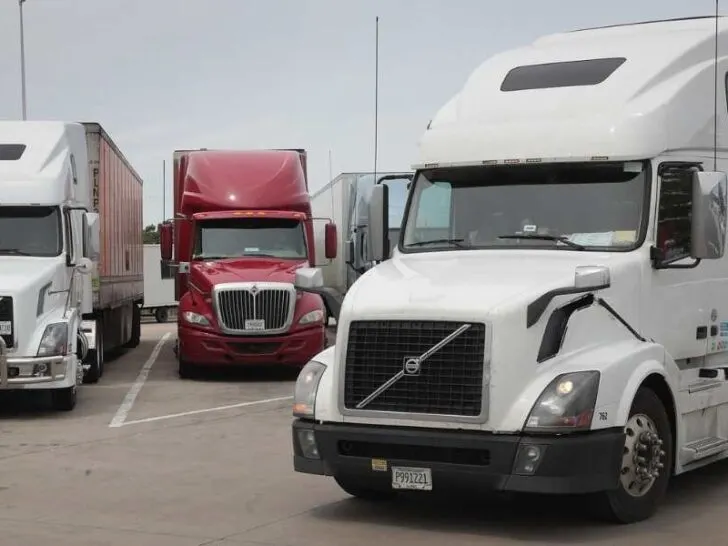Self-insurance policy exists for massive trucking companies with hundreds of vehicles, high annual sales, and significant weight hauling capacities.
Can a Trucking Company Be Self-Insured? A trucking company can be self-insured by directly getting a registered policy according to Federal Motor Carrier Safety Administration guidelines and save money. Also, take an insurance policy directly by narrating the financial status, business bottom line, number of fleets, and overall infrastructure. Then, get a logo for transporting trucks and pay loss compensating from insurance company funds.
In addition, the trucking business remains on the verge of different challenges, losses, and risks. The policy provides insurance for the auto liability, cargo, and truck physical damage.
The self-insurance program started in 1986, and now more than 26 trucking companies have established self-insurance strategies.
Typically, any trucking business that insures its risks and damages with credits and funds gets the appropriate verification of this policy. In addition, several well-known trucking businesses are working in this principle presently without any significant reported accidents.
Also, the private asset remains safe throughout the agreement. In addition, the associated organization interferes while the trucking owner does anything against its standard policies.
However, the organizations cost you around $2100 to $4000 for these registrations. It is their fee for establishing and providing the policies to well-known trucking businesses.
What is a self-insured trucking company and its mechanism of action?
Typically, a self-insured trucking business does not maintain commercial insurance for accidents or other vehicle crashes. In addition, these businesses utilize the funds of an authentic Federal safety portal.
In such conditions, the company owner fulfills their entire requirement, fills a form, registers the company, and gets the insurance amount.
The policy works as a safety guard for unpleasant events and massive money deduction events. The insurance costs reduce due to lower needs. In this way, the claim handling becomes convenient for the LLC trucking company owner.
Also, it is a viable option for the big-pocket businessman. In addition, the scenario of self-insured companies and their accidents are different from regular ones. In this way, you can communicate with the other party, guide them about your policy, and refund their losses.
The insurance coverage of the trucking companies varies according to their financial statements, number of fleets, and federal state laws. However, the average range is around $750000 to $101 million.
How to get self-insurance for your trucking company?
Typically, a few criteria, specifications, and standards help a trucking company to get self-insurance.
Also, the procedure charges for the insurance policies. You can negotiate these costs according to the number of fleets, employees, and other services.
As an owner, you need to arrange a meeting with the authorized representative.
In addition, carry all the relevant documentation of your business with the number of vehicles.
Also, narrate all the minor details of your company and inform them about the bottom financial status of the business.
Furthermore, as an owner, provide them with all the documentation and get self-insurance approval from the FMCSA.
In addition, the FMCSA has different standards and policies. Company owners cannot violate such rules and regulations. According to the FMCSA guidelines, the midsized trucking companies have lesser trucks and shipment vehicles.
In addition, they have around 160 to 1600 truck fleets that cannot get a $1 million to $1.2 million self-insurance.
Also, they cannot justify the profit limits of their business in the next 2 to 4 years according to the limits.
In addition, the small companies with less than 400 to 600 trucks are not eligible for self-insurance policies. Across the USA, no policy supports such small businesses for these massive investments.
However, the policy has multiple advantages that instigate small businesses. And, few small truckers do not accept the claims of FMCSA and its policies.
In addition, the authorities guide them about the consultation with an authentic lawyer. He can also save money for them and decompensate their trucks.
Get a self-insurance logo
Typically, the truck driver and truck are not responsible for any loss after critical accidents. Also, the other party can access the self-insurance logo on the company tuck. They wait for the authorities and get their compensation without any issue.
In addition, the policy follows similar rules like of many other automobiles. Also, it provides money for the treatment of truck or semi-truck drivers.
Collect the documentation
Typically, it deals with the claims and accidental situations without significant problems.
Also, a few of them deny the actual problems and leave the accident victim at the spot.
In addition, the complaints registered at the insurance companies. As a victim, narrate all of your details, insured company names and get your compensation from them.
Fill the fee and access policies
Typically, access the below guidelines and file for self-insurance of your trucking company. In addition, learn the policies carefully because they are part of an authentic portal that works under government rules.
In addition, according to Federal Motor Carrier Safety Administration, the top trucking companies in the USA should fulfill the following standards.
In addition, the trucking business should maintain the minimum amount of responsibility that works as financial responsibility or insurance money.
In addition, show documents about the sales and profits to the authorities. Also, describe the side amount for the hospital treatment of injured employees, health policies, and other standard agendas.
In addition, the companies with vehicles of around 11000 to 12000 pounds must have a minimum limit of $800000. Also, they should haul non-hazardous material from one end to another destination.
In addition, the companies with hauling trucks that transport 11000 pounds to 12000 pounds of hazardous material need to adjust a minimum insurance limit of $1100000.
Those trucking services that help the clients in the shipment of hazardous, radioactive, and waste material should maintain a minimum limit of around $5100000.
Also, these are the minimum specification of the Federal authority. In addition, the limits vary according to states and their federal rules of transportation.
Why should a trucking company get self-insurance?
It facilitates the tucking business with multiple benefits and secures the overall money loss.
In addition, the self-insured trucking businesses stand out significantly from any other business affiliated with some companies.
Safety concerns
The safety concerns of the truck drivers and self-insured trucking business are lower than a standard setup. Also, they work fearlessly due to their high profits, controlled mechanism, and registered policies.
In addition, during critical accidental situations, these businesses compensate the amount from the insurance company funds in no time.
In addition, it does not affect their personal properties and profits. But, the massive business with million-dollar sales can afford these policies.
In addition, these heavy-pocket businessmen do not care about the small losses, but the relevant authorities keep the records.
Also, they inspect the leading causes and pieces of advice for rectification. Also, while the company violates the standard rules, the insurance authorities cancel the agreement with a written notice.
Cost negotiation
Typically, the policy profits the trucking company. In such situations, the authorities make several deals without any fear. Also, they provide negotiable packages with different criteria.
As a result, the chances of accidents exist, but the problems become resolvable.
In addition, the massive business setups do not care about loads and transportation, but they record losses. You can also file for tax exemption for your trucking company.
No commercial insurance activities
After registration for a self-insurance policy, the company depends on it.
Therefore, the claims become deniable with different strategies. In addition, it helps in saving a massive portion of the money.
Reversible losses and money replacement
In sudden truck crashes with other vehicles, the company may face a few losses of loaded material.
In addition, the insurance funds of the federal motor company compensate for these problems.
Also, the company can provide similar equipment to their client without any complaint. Refunding lost money is attractive for such mega business holders.
Are there any cons of a self-insured trucking company?
Generally, a self-insured business can face poor claims at any time. Also, the fear of accidents reduces from the truck drivers and their stops managing the appropriate procedure.
In addition, eventually, the business owner loses a lot of money due to a careless attitude towards funds.
Related Articles:
Names of trucking companies in Billings, MT

